Synopsis with commentary by Kilohana Hirano and Kalehua Simeona, who contributed mele for this production. Production photos are from the March 2016 all-school presentation of the opera.
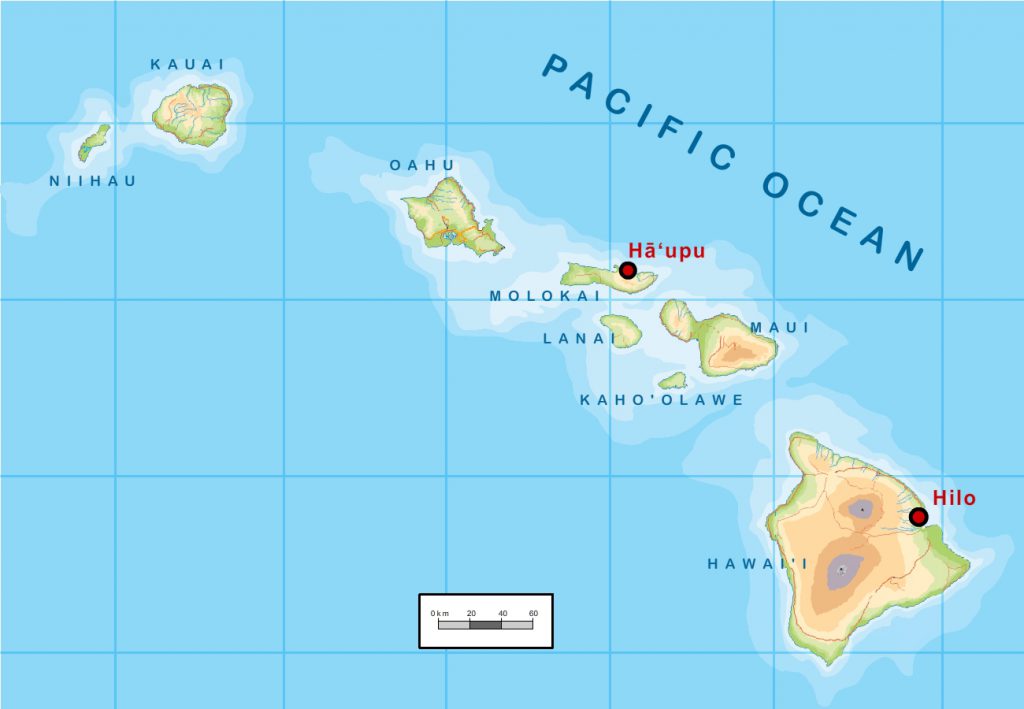

PROLOGUE
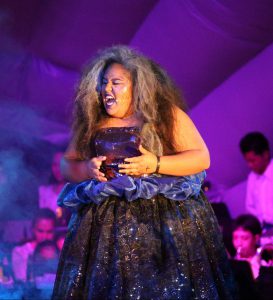
Uli sets the stage by recounting Kana’s genealogy (“ʻOaka Ka Lani”). Her chant proclaims the sacredness of Kana and how she empowers him.
Like many in our mythological history, Kana was born ʻeʻepa – extraordinary and with miraculous powers. Claps of thunder, flashes of lightning, cracks and crashes of earth all heralding this auspicious being. From the loins of Hina, a progeny of Hākalanileo, raised at Hālauoloolo by Uli – ʻO Kana ke kaula, ke keiki, ka ʻeu kupuʻeu. “Kana, the rope, the child, the hero” — Kilohana Hirano
Uli ends the prologue by laying out the conflict between Hilo and Molokaʻi, the abduction of Hina by Molokaʻi chief Kapepeʻekauila and the dire consequences for all involved.
ACT ONE
Scene One—Mokuola, Hilo
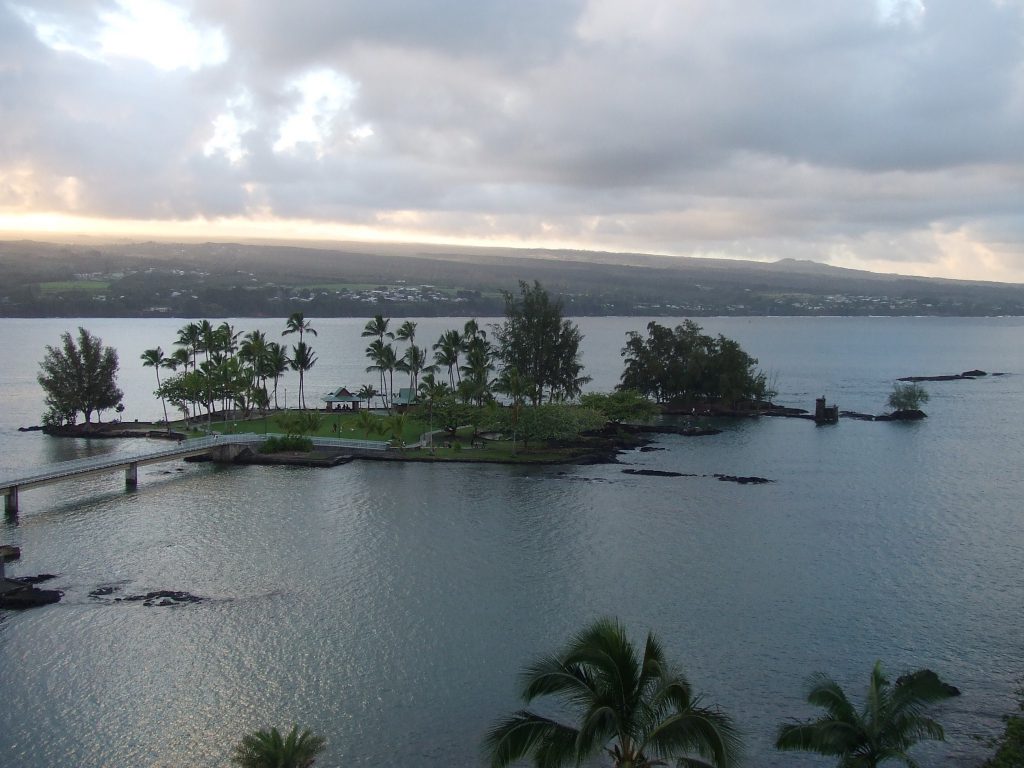
Hina, a chiefess of Hilo and the wife of the ruling chief Hākalanileo, bathes in the moonlight assisted by her entourage of attendants (“A Hilo Au I Ka Pō Laʻi”).
“A Hilo Au I Ka Pō Laʻi” was composed for the original Hōʻike in 2011 to capture a moment where Hina and her attendants enjoy an evening under the moonlight while surrounded by fragrant hala and kissed by the Kanilehua rain at Mokuola. Metaphors of romance can be found in the cool mauka breeze and the playful seaspray. – Kalehua Simeona
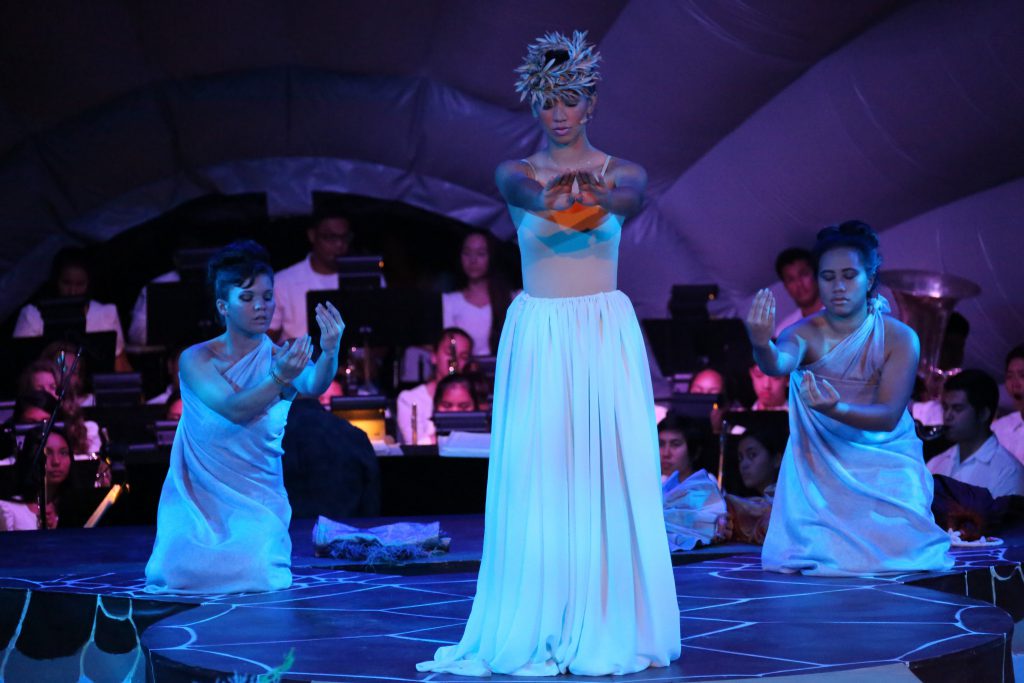
Here in the privacy of her attendants, she is able to confide her ennui (“Pulupē I Ke Au Kai”).
No sooner has she finished her lament than Kapepeʻekauila arrives to steal her away in a plot to ransom peace between Hilo and Molokaʻi. Upon seeing Hina, Kapepeʻekauila cannot resist her beauty (“He Leo Kū I Ka Pō”). The seeds of love are planted. His brother, Keoloʻewa recognizes this change in his brother and reminds him that they are there to take her. Kapepeʻekauila composes himself. Despite resistance from her attendants, Hina is whisked away by the rogue chief.
Scene Two—Pi‘ihonua, Hilo. A few days later.
Kana tries desperately to discover his missing mother’s whereabouts by using the powers he has been given by his grandmother and kahu, Uli. Uli knows where her daughter Hina has been taken, but will not freely reveal her location lest she lose her prophetic powers.
Niheu, Kana’s brother, enters and attempts to convince his grandmother to reveal his mother’s location. Uli refuses. As with Kana, she recognizes freely giving the information to her grandsons will deprive them of a necessary life journey to maturity.
Hākalanileo, Hina’s husband, arrives along with his brother Haho. Their purpose is to seek Uli’s help in finding Hina. They honor Uli with a chant of homage (“Ka Wahine Noho Kuauli”) to flatter Uli so that she will disclose Hina’s whereabouts.
Deep in verdant forest, in the company of the most sacred. A mele inoa for Uli, mother of Hina; grandmother of Kana, a prophet deserving of only the highest kapu. E ō mai ka wahine noho kuauli, ʻO Uli ka makāula i ke kapu. — Kilohana Hirano
Uli sees through it, though, and rebukes Hākalanileo’s methods of torturing people during the search, and for not heeding her prophecy that this tragedy would occur if he married Hina. Hākalanileo and Haho assert that they are doing everything in their power to find Hina (“E Huʻe Ke Kūpeʻe”). Uli dismisses them. Insulted for the final time, Hākalanileo and his entourage leave.
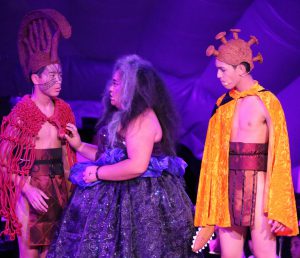
In a final attempt to discover his mother’s whereabouts, Niheu attempts to convince his brother Kana (“Ua Pili I Ke Koko”) that they must set out on their own to find their mother. Uli stops Kana from joining Niheu because she feels he is not ready for such a journey.
Scene Three—Hā‘upu, North Coast Molokai. Later the same day.
Kapepeʻekauila and his warriors return to Hāʻupu after their Hilo raid and celebrate their stolen treasures including Hina (“Kū ʻAʻe ʻO Hāʻupu”). Nuʻakea, wife of Keoloʻewa, brother to Kapepeʻekauila, recognizes Hina and accompanies her to her quarters.
Scene Four—Hā‘upu, Moments later.
Hina is tired and confused. Nuʻakea attempts to comfort her while Hina continues to express disquiet at her circumstances. Hina recognizes Nuʻakea as an aliʻi, and learns that Nuʻakea is Keoloʻewa’s wife. She then attempts to persuade Nuʻakea to ask Keoloʻewa to free her. Nuʻakea lets Hina know that although Keoloʻewa is aliʻi nui of Molokaʻi, there is only one chief of Hāʻupu and that is Kapepeʻekauila. Hina queries Nuʻakea as to why she left Oʻahu to lead a life of exile on Molokaʻi. Nuʻakea replies that she did not believe in the new kapu system of Paʻao. She would rather live as an exile in freedom than be bound to a restrictive system of privilege. This resonates with Hina’s ennui. This insight generates a vision of doom for Hāʻupu as expressed by Hina (“Pōhina”). Nuʻakea concedes that her prophet brother, Moi, has seen a similar destiny. Exhausted, Hina finally falls asleep where she is haunted by the prophecy of Moi as related in a hula kiʻi (“Moe ʻUhane”).
Alone and determined, Kana expresses his undying love for his mother and promises that he will find her (“Kaula Kupuʻeu”).
Although discarded to the cane field at birth, Kana remains loyal to his mother Hina. As he toils with the decision to make chase to rescue her from her captors. He recalls her beauty – brilliant like the glow of the moon. The beauty of Hilo. Na wai e pakele aku… — Kilohana Hirano
ACT TWO
Scene One. Kauhale of Hākalanileo. Hilo. A week later.
As his search for Hina proves unsuccessful, Hākalanileo has invited chiefs from other districts and islands to help in his quest. To celebrate a unified pact to find the missing chiefess, Hākalanileo gives a large feast. For after-dinner entertainment, the party plays a game of kilu (“Kau Ka Haliʻa”).
“Kau Ka Haliʻa” is an adaptation of a Mele Aloha found in the moʻolelo of Hiʻiakaikapoliopele. Love is celebrated in the lehua groves of Panaʻewa. Konikoni maʻeʻele lā i ke kino, “Loveʻs desires leave the body numb.” “– Kalehua Simeona
At the height of the festivities, Niheu enters, dismayed at his father’s capriciousness. He admonishes his father for not trying hard enough and reveals that he has discovered the whereabouts of his mother. Through a round of kilu and with the help of Kana and his Shadows, it is revealed that Hina is being held captive at Hāʻupu, Molokaʻi by none other than the chief Kapepeʻekauila (“Naka Ka Papa O Kaiolohia”). Hākalanileo doubts this, but Niheu vouches for its validity and calls him to action. Hākalanileo hesitates while his brother, Haho, takes up the challenge: onward to Molokai and the rescue of Hina.
Scene Two. Kuhaimoana, Hā‘upu. Early evening the following day.
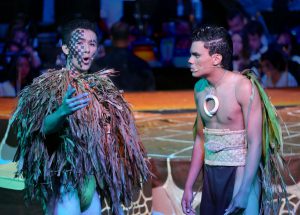
Kapepeʻekauila and Keoloʻewa, go through a late afternoon regimen of exercise. Keoloʻewa banters about his brother’s ulterior motives for kidnapping Hina. Kapepeʻekauila assures his brother that his intentions are not selfish in nature, and that Hina’s kidnapping is to goad the chiefs of the other islands to act. Through the discussion, it is revealed that Kapepeʻekauila’s true motivations lie in his responsibility to be true to his gods and live out his destiny to oppose the new system of kapu brought to the islands by Paʻao. Keoloʻewa does not believe this and the conversation turns confrontational as the two brothers argue over the validity of such a destiny. Keoloʻewa believes surrendering to the new system and surviving is better than dying. Kapepeʻekauila does not agree. Keoloʻewa redirects and queries his brother to see if his true intention is to have children with Hina, which could bridge the two belief systems. Kapepeʻekauila tells his brother that after he defeats Hākalanileo, he plans to set Hina free so that she can return to her island and testify to the resolve of Hāʻupu, and that they live the way of their ancestors, unoppressed by the gods of a foreign land (“No Hāʻupukele Kāna Mele”). The scene ends with a messenger reporting that Hina and Nuʻakea are touring Hāʻupu. Kapepeʻekauila goes to join them.
Scene Three. Hā‘upu. Moments later.
As the sun sets, the residents of Hāʻupu celebrate the greatness of their land (“Aloha Hāʻupu”).
“Aloha Hāʻupu” was also composed in 2011. The people of Kapepeʻekauila welcome Hina and celebrate the conquest of their aliʻi. A sweet whistle can be heard in the uplands as the people gather ashore in adoration and support. – Kalehua Simeona
This celebration segues into a duet by Hina and Nu’akea recognizing the beauty of the sunset (“E Kau Mālie Ka Lā”). The bond of motherhood is established between the two women. This peaceful moment is disrupted by Kapepeʻekauila’s entrance. Hina rebukes him for his actions and motivation. He asks her if she does not see the peacefulness of a people living in communal harmony of their ancestors. She scoffs at his hypocrisy, arguing that he has deprived her of such freedom. He assures her she has nothing to fear from him. She continues to chide him, challenging her captor to prove his benevolence by setting her free. Impressed by her resolve, he reveals his intention to use her as a witness of Hāʻupuʻs determination to remain independent forever (“No Hāʻupukele Kou Mele”). The seeds of romance begin to sprout.
The Act ends with a report that Hākalanileo and the other island chiefs, have launched a vast armada bound for Hāʻupu. The alarm is given to prepare for battle. Hina predicts that the morning will bring a red tide. Hāʻupu’s destiny is set, but who will set it right?
ACT THREE
Scene One. Battleground Hā‘upu. Dawn. A few days later.
As Uli pays homage to the Kana’s great war canoe, Kaumaiʻeliʻeli (“Kaumaielieli Nā Waʻa O Kana”), the forces of Oʻahu and Maui engage Kapepeʻekauila’s forces. Initially, the Hāʻupu forces begin to yield the field until Kapepeʻekauila rallies them on (“Lohe ʻia Ka Nākolokolo”). The tide of battle shifts and Hāʻupu is victorious.
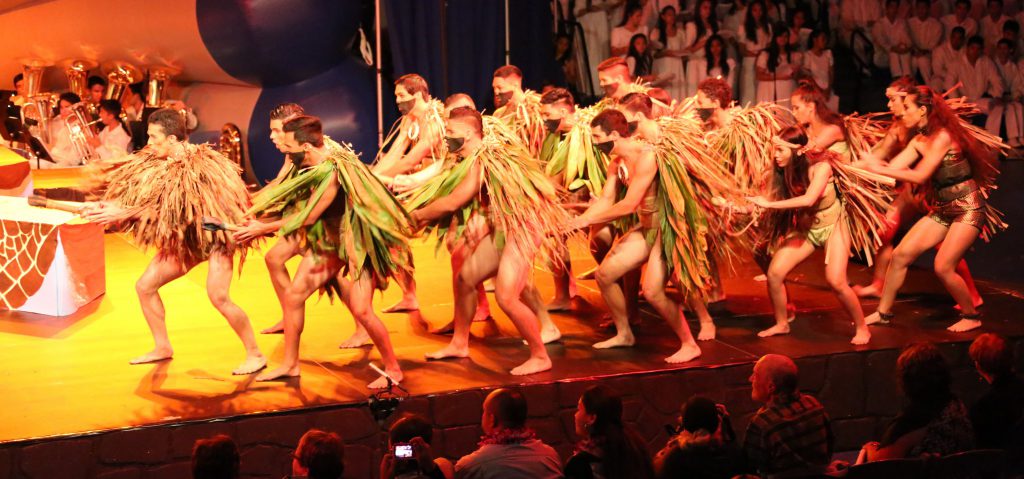
Scene Two. Hā‘upu. Moments later.
From her vantage point, Hina witnesses the carnage of the battle. The fact these warriors are dying in order to rescue her upsets her greatly. Nuʻakea enters dressed in battle gear ready to defend Hina if any enemy should enter. She tries to assuage Hina’s despair, but Hina is nonplussed and tries to end her life. Nuʻakea stops her. Nuʻakea admits she does not like the death of so many warrior sons. Appealing to her motherly instinct, Nuʻakea attempts to persuade Hina to contact her son Kana and end the onslaught. Hina admits she receives dreams from Kana, but cannot contact him directly. Consequently, the two women plot Hina’s escape before the Hilo forces attack. Nuʻakea promises that when the Hilo forces arrive the following day, she will help Hina escape to safety with her sons.
Scene Three. Aboard the Kaumai‘eli‘eli. Dawn.
As Hākalanileo and his entourage sleep, Kapepeʻekauila’s agent, Keaʻulenakahi, (the “swordfish”), boards the vessel to assassinate the chief (“Ke Ola Kapu”).
As Kana and Niheu prepare for the arduous journey to Hāʻupu, Uli foretells of the dangers ahead. The rough seas of the ʻAlenuihāhā Channel, the joining of forces, and the ensuing battle with the assassin Keaʻuleinakahi. — Kilohana Hirano
Keaʻulenakahi is subdued and escapes before she can complete her task.
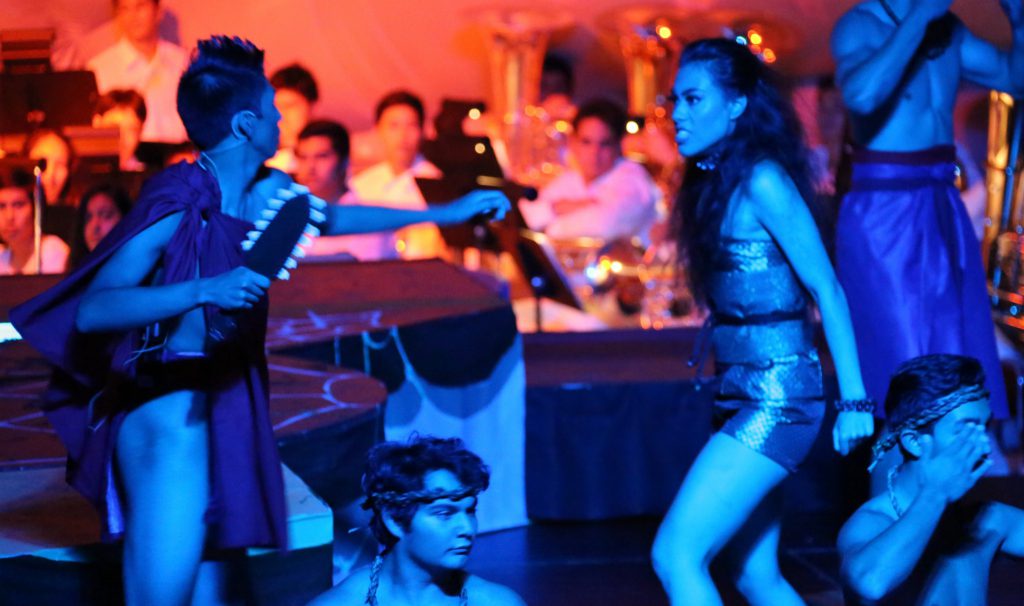
Nursing a flesh wound, Hākalanileo decides to turn back. He fears that Kapepeʻekauila’s rogue methods and lack of respect for the kapu make him unstoppable. Niheu accuses his father of cowardice and lacking true love for his mother. Hākalanileo takes offense, but does not deny that he is unwilling to risk death for Hina. He believes Hina has been tainted by the Molokaʻi chief, thus she is not worth saving. Niheu and Kana decide to break with their father and continue with whatever force is willing to go with them. Haho volunteers to continue on with Niheu and Kana, promising Hākalanileo that his victory will be all of Hilo’s victory.
Scene Four. Aboard the Kaumai‘eli‘eli. Dawn. Moments later.
Kana calls for a covering of fog to conceal the Hilo forces’ advance (“Noenoe Wale Iō Kaumai’eli’eli”).
Nearing his destination on the northern shore of Molokaʻi, Kana makes ready for their approach and calls upon the elements to provide cover over his canoe – Kaumaiʻeliʻeli. Dark clouds roll in with the ʻŪkiu wind, cloaking Kaumaiʻeliʻeli. — Kilohana Hirano
Hina senses the fog is from her son and answers with a reprise of “Kaula Kupuʻeu”. Kapepeʻekauila enters, overhearing Hina’s plea to her son for her rescue.
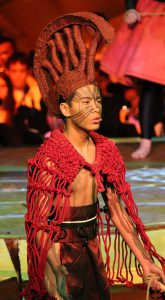
Kapepeʻekauila rejoices over the fog, believing it will stymie the advance of the Hilo forces and allow his warriors to rest. Hina reproves him for his hubris and threatens to ruin his plan by refusing to be rescued. This prospect upsets Kapepeʻekauila and he threatens to send her back with the bones of her sons. She echoes Kapepeʻekauila’s comment that she is a prisoner of her beauty. Hina finds temporary comfort in his arms until a messenger arrives announcing an assault by the Hilo forces. Kapepeʻekauila realizes his pride has led to his undoing. Upon his exit Hina secretly prays for his safety.
Scene Five. Ridge at Manuahi. Hā‘upu. Early Morning.
While being pursued by a force of Hāʻupu warriors, a small detachment of Hilo warriors including Niheu and Haho race toward Hāʻupu. Haho pauses to confer with Niheu. He is worried that they are being chased into a trap. He suggests one warrior continue up to rescue Hina while the others make a stand at the present spot. Niheu agrees and offers to be the lone warrior to rescue his mother. Haho offers to take his place because he feels Niheu can rally the warriors to make a successful stand. Niheu agrees. Haho continues on up the ridge to rescue Hina on his own.
Niheu and the warriors dig-in. Kapepeʻekauila arrives with his warriors and takes the field. Niheu falls and is about to be sacrificed when Kapepeʻekauila stops Keoloʻewa. Moi realizes circumstances may have changed between Kapepeʻekauila and Hina. Keoloʻewa notices that Haho is not present. Once more Kapepeʻekauila realizes his oversight and races up the hill to Hāʻupu.
Scene Six. Hā‘upu. Moments Later.
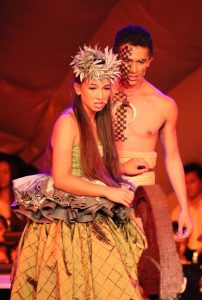
Haho enters Hina’s sanctuary. At first Hina believes it is Nuʻakea there to take her to her sons. Haho lets her know that she is now his, because of a deal he has made with her husband Hākalanileo and that her sons are dead. Hina resists him. Kapepeʻekauila enters and kills him. Kana enters and engages Kapepeʻekauila. Kana subdues Kapepeʻekaulia, but Hina stops Kana from killing him.
Moi and Keoloʻewa enter with what is left of the Hāʻupu warriors and Niheu. Moi reports his prophecy has come to pass: Hāʻupu is vanquished. Hina offers to negotiate peace with the Hilo, Maui, and Oʻahu warriors. Kapepeʻekauila refuses her offer. He knows he must not betray his gods. He must fulfill his destiny. Hina exits with her sons taking one last look at her vanquished captor.